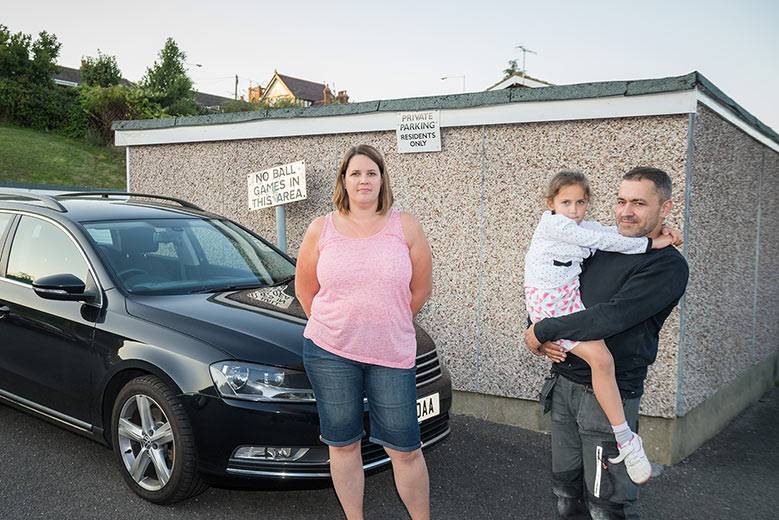It is a situation replicated across Tunbridge Wells and beyond – the clash between commuters and residents over parking.
Train travellers trying to avoid sky-high station car park prices leave their vehicles in surrounding roads.
The issue is often solved to residents’ satisfaction by introducing permits, but while Tunbridge Wells Borough Council charges about £60 per year for these, residents of a cul-de-sac off North Farm Road will have to pay £400 to Town & Country Housing.
Sarah Lines, who has lived in the road for eight years, explained that she and her neighbours use a car park off the cul-de-sac.
She said: “It’s a nightmare with commuters. There are signs saying residents’ parking only and we’ve asked them not to leave their cars there but they park wherever they want.
“We got a letter from Town & Country saying it would be permit-holders only from October and we thought ‘great, we’ll be able to park’. Then they said it was going to be £700 and we thought ‘you can’t be serious’.”
Parking at High Brooms station costs £80 per month on a season ticket, or £872 per year.
But accountant Miss Lines, 36, said: “We don’t use the station, and we can’t afford that.
“It’s a stupid amount. And the car park will be patrolled every day, we won’t even be able to park there at weekends.
“One man from Town & Country was nice but he forwarded me an email from a manager which gave the impression: ‘It’s our land and we can charged what we want’. He didn’t care.”
Town & Country has since reduced the annual permit price to £400.
But mother of two Miss Lines said: “That’s still extortionate. Good news they’re budging a little, but the residents need more.
“There’s about nine spaces in the cul-de-sac but commuters use those. There’s nowhere else. There are families with babies in the road, I’ve got two children, and we won’t be able to park anywhere near our homes.
“It’s going to be a nightmare. We sometimes save spaces with bins but the commuters will move them – they don’t care.”
A Town & Country spokesman said: “The money will be invested into our services.
“There are 17 spaces and we will allocate 17 permits.
“By purchasing permits, residents will have access to a space each day which is better than other parking schemes in the area. Following discussions with residents and their local councillor, we have reduced the permit cost for residents of the cul-de-sac and some houses in adjoining streets to £400. Our tenants will be offered a further discount.”
A Southeastern spokesman said: “Our prices are comparable to other parking charges. At High Brooms station, a daily parking ticket is £5.10, compared to the £5.20 the council charges in the Yew Tree Road car park. If commuters buy monthly season tickets they can save more as this costs £80.50, £4.03 per day.
“We would always recommend passengers use our car parks when using our stations, but we cannot prevent passengers from using residential areas to avoid paying.”
Asked whether Southeastern thought it acceptable to add £872 per year to the bill of those already paying thousands for travel and that were this less, the parking conflict might lessen, the spokesman replied: “Please refer to our earlier statement.”
Commuters should ‘be more considerate’
Commuters are entitled to park in residential streets – but should be more considerate, according to one homeowner.
David Hobden told the Times he had to direct traffic when an articulated lorry ‘got wedged between two cars’ in Highfield Road last Wednesday.
The 41-year-old, who lives in Welbeck Avenue near High Brooms station, said: “It’s because of the way they’d been parked, without thinking.
“These are public rights of way, everyone’s entitled to park here, but it’s the way they do it. People abandon cars and run, leaving them overhanging driveways, at the ends of roads, on bends – if an emergency vehicle tried to get through, it would be a nightmare.”
Last Wednesday, father of two Mr Hobden helped direct traffic so the lorry could get through.
He said: “It was stuck because of the way the commuters had parked, on both sides on a corner.
“I can see that if you’re paying thousands for train travel, you don’t expect to pay more for station parking, it should be free. I choose to live near the station, it’s been here longer than I have, and it’s everyone’s right to park on the roads – just park legally and considerately and it won’t be an issue.”
Hugh Bladon, of the Alliance of British Drivers, said the reduction from £700 to £400 was ‘a step in the right direction’.








